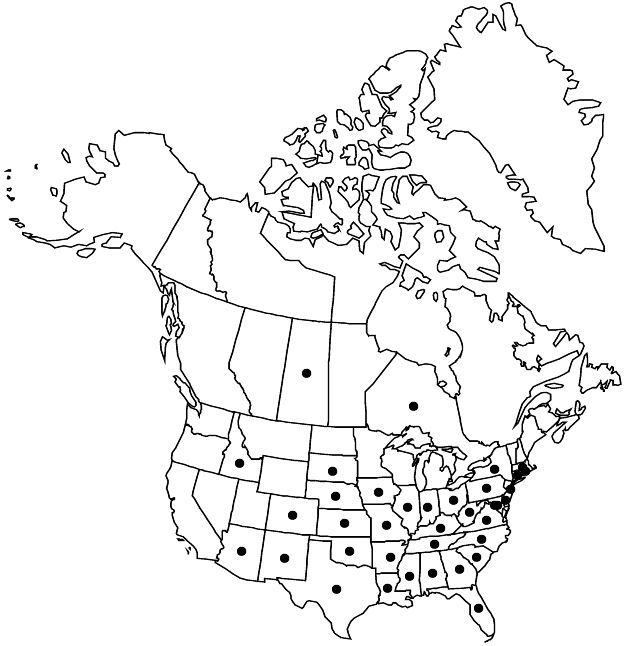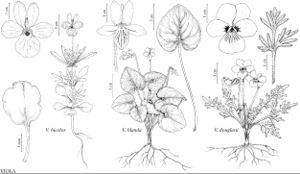Difference between revisions of "Viola bicolor"
Fl. Amer. Sept. 1: 175. 1813.
FNA>Volume Importer |
imported>Volume Importer |
||
| (6 intermediate revisions by 2 users not shown) | |||
| Line 13: | Line 13: | ||
}}{{Treatment/ID/Special_status | }}{{Treatment/ID/Special_status | ||
|code=F | |code=F | ||
| − | |label= | + | |label=Illustrated |
}} | }} | ||
|basionyms= | |basionyms= | ||
| Line 19: | Line 19: | ||
|name=Viola kitaibeliana var. rafinesquei | |name=Viola kitaibeliana var. rafinesquei | ||
|authority=(Greene) Fernald | |authority=(Greene) Fernald | ||
| − | }}{{Treatment/ID/Synonym | + | |rank=variety |
| + | }} {{Treatment/ID/Synonym | ||
|name=V. rafinesquei | |name=V. rafinesquei | ||
|authority=Greene | |authority=Greene | ||
| + | |rank=species | ||
}} | }} | ||
|hierarchy=Violaceae;Viola;Viola bicolor | |hierarchy=Violaceae;Viola;Viola bicolor | ||
| Line 37: | Line 39: | ||
|elevation=0–3000 m | |elevation=0–3000 m | ||
|distribution=Ont.;Sask.;Ala.;Ariz.;Ark.;Colo.;Conn.;Del.;D.C.;Fla.;Ga.;Idaho;Ill.;Ind.;Iowa;Kans.;Ky.;La.;Md.;Mass.;Miss.;Mo.;Nebr.;N.J.;N.Mex.;N.Y.;N.C.;Ohio;Okla.;Pa.;R.I.;S.C.;S.Dak.;Tenn.;Tex.;Va.;W.Va. | |distribution=Ont.;Sask.;Ala.;Ariz.;Ark.;Colo.;Conn.;Del.;D.C.;Fla.;Ga.;Idaho;Ill.;Ind.;Iowa;Kans.;Ky.;La.;Md.;Mass.;Miss.;Mo.;Nebr.;N.J.;N.Mex.;N.Y.;N.C.;Ohio;Okla.;Pa.;R.I.;S.C.;S.Dak.;Tenn.;Tex.;Va.;W.Va. | ||
| − | |discussion=<p>Viola bicolor is the only pansy native to North America (V. B. Baird 1942; J. Clausen et al. 1964; A. E. Radford et al. 1968) and is the only annual Viola species that produces cleistogamous flowers (Baird; A. Gershoy 1934). Roots of V. bicolor have the odor of wintergreen when crushed (W. J. Hayden and J. Clough 1990).</p> | + | |discussion=<p><i>Viola bicolor</i> is the only pansy native to North America (V. B. Baird 1942; J. Clausen et al. 1964; A. E. Radford et al. 1968) and is the only annual <i>Viola</i> species that produces cleistogamous flowers (Baird; A. Gershoy 1934). Roots of <i>V. bicolor</i> have the odor of wintergreen when crushed (W. J. Hayden and J. Clough 1990).</p> |
|tables= | |tables= | ||
|references= | |references= | ||
| Line 46: | Line 48: | ||
-->{{#Taxon: | -->{{#Taxon: | ||
name=Viola bicolor | name=Viola bicolor | ||
| − | |||
|authority=Pursh | |authority=Pursh | ||
|rank=species | |rank=species | ||
| Line 60: | Line 61: | ||
|publication title=Fl. Amer. Sept. | |publication title=Fl. Amer. Sept. | ||
|publication year=1813 | |publication year=1813 | ||
| − | |special status=Endemic; | + | |special status=Endemic;Illustrated |
| − | |source xml=https:// | + | |source xml=https://bitbucket.org/aafc-mbb/fna-data-curation/src/2e0870ddd59836b60bcf96646a41e87ea5a5943a/coarse_grained_fna_xml/V6/V6_200.xml |
|genus=Viola | |genus=Viola | ||
|species=Viola bicolor | |species=Viola bicolor | ||
Latest revision as of 22:19, 5 November 2020
× 0.3–1 cm, base attenuate, margins entire or crenate-serrate especially toward apex, eciliate, apex rounded to obtuse, surfaces glabrous or sparsely pubescent. Peduncles 1–4.5 cm, glabrous or pubescent. Flowers: sepals ovate to lanceolate, margins ciliate or eciliate, auricles 0.5–2 mm; petals white or cream to pale bluish violet on both surfaces, dark purple-veined, lateral 2 longer than sepals, bearded, lowest 8–10 mm, spur white to blue-violet, gibbous, 1–1.5 mm, shorter than or equaling sepal auricles; style head bearded; cleistogamous flowers axillary. Capsules ellipsoid to oblong, 4–7 mm, glabrous. Seeds beige to bronze, 0.3–1.5 mm. 2n = 34.
Phenology: Flowering Mar–May.
Habitat: Prairies, open woodlands, fields, pastures, roadsides, lawns, waste ground
Elevation: 0–3000 m
Distribution

Ont., Sask., Ala., Ariz., Ark., Colo., Conn., Del., D.C., Fla., Ga., Idaho, Ill., Ind., Iowa, Kans., Ky., La., Md., Mass., Miss., Mo., Nebr., N.J., N.Mex., N.Y., N.C., Ohio, Okla., Pa., R.I., S.C., S.Dak., Tenn., Tex., Va., W.Va.
Discussion
Viola bicolor is the only pansy native to North America (V. B. Baird 1942; J. Clausen et al. 1964; A. E. Radford et al. 1968) and is the only annual Viola species that produces cleistogamous flowers (Baird; A. Gershoy 1934). Roots of V. bicolor have the odor of wintergreen when crushed (W. J. Hayden and J. Clough 1990).
Selected References
None.
